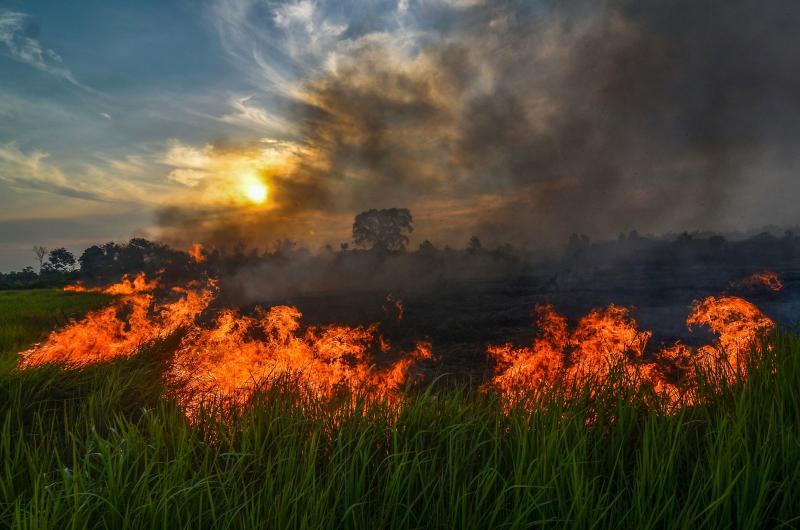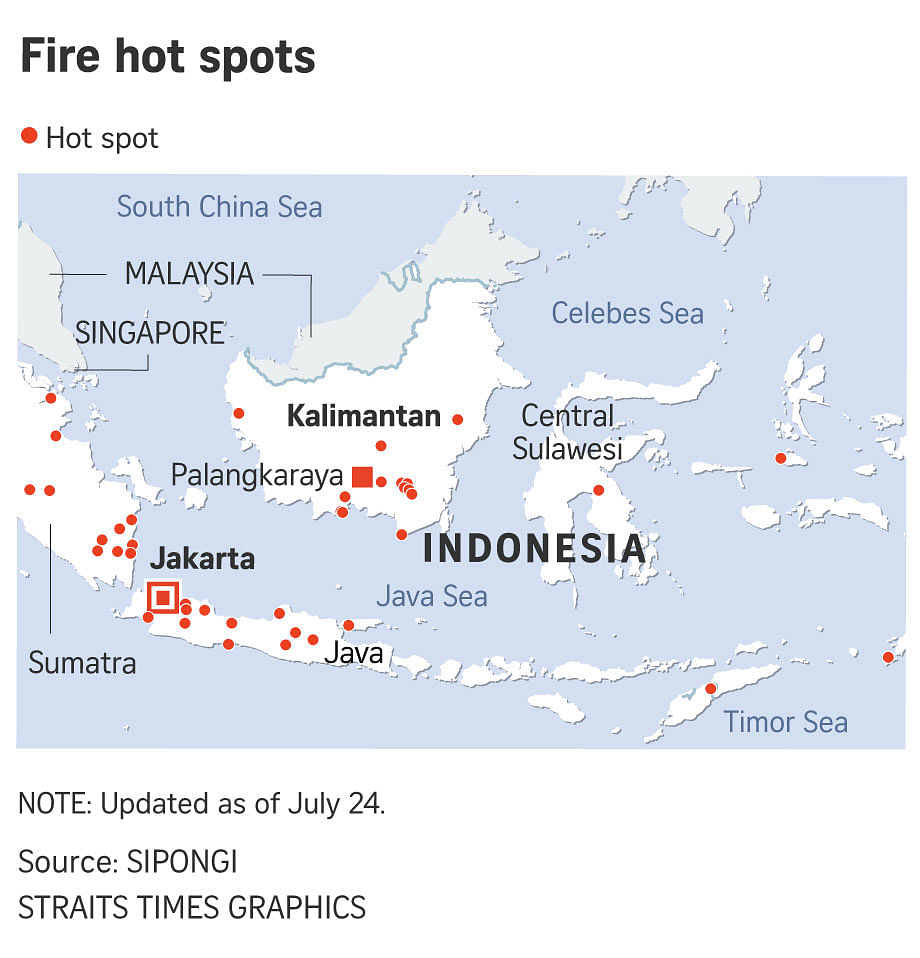Indonesia fights spreading fires in Central Kalimantan as dry season is set to peak
Sign up now: Get insights on Asia's fast-moving developments

Three areas in Central Kalimantan with forest and plantation fires are Palangkaraya, Pulang Pisau and Gunung Mas regencies.
PHOTO: AFP
Follow topic:
JAKARTA - Indonesia is stepping up efforts to fight spreading forest fires in Central Kalimantan province on Borneo island that have moved closer to residential areas and public roads.
The dry season is expected to peak soon in the province, prompting the authorities to increase firefighting efforts.
Two helicopters on Tuesday (July 23) were deployed to Palangkaraya, the provincial capital, for water-bombing runs to remote areas.
"We have started water-bombing in Central Kalimantan. The ground and air teams are ready in five provinces," Mr Dody Ruswandi, the secretary-general of Indonesian disaster mitigation agency (BNPB), told The Straits Times.
Fires have also occurred in Sumatra and Java.
"The situation in Sumatra is under control," Mr Dody said.
Three areas in Central Kalimantan with forest and plantation fires are Palangkaraya, Pulang Pisau and Gunung Mas regencies. Each of the 34 Indonesian provinces is made up of cities and regencies.
Other Indonesian provinces vulnerable to fire are West Kalimantan and three in Sumatra: Riau, Jambi and South Sumatra. Haze spawned by forest and plantation fires that travelled across borders to Singapore usually comes from Sumatra.
The number of hot spots detected by satellites on Wednesday morning was 76 in Kalimantan, 49 of which were in Central Kalimantan. In Sumatra, there were three hot spots, two of which were in Riau, according to BNPB. This compares with more than 750 hot spots just in Sumatra in mid-October 2015 at the peak of the fire crisis.
On Monday, each of the five provinces prone to fire received a deployment of about 1,500 military personnel and police officers to help with firefighting efforts, Mr Dody said.
The peak of the dry season is usually August and September in the south and central parts of Kalimantan.
Fire-prone Riau province, the part of Indonesia closest to Singapore, has two dry seasons a year - February-March and June-August - and the wind direction in the latter season would be towards the north-east, or in the direction of Singapore and the Malaysian peninsula, according to Indonesian weather agency BMKG.
President Joko Widodo's administration has been resolute in tackling forest and plantation fires, and illegal logging, following the 2015 fires which caused more than 500,000 Indonesians to suffer respiratory ailments after they were exposed to the choking haze that crossed borders and blanketed parts of Singapore and Malaysia.
Stepped-up law enforcement - including a shoot-on-sight order against fire-starters - and better firefighting equipment mandated for plantation firms have resulted in a significant decline in the scale of the fires, an annual phenomenon usually in the dry season.
Mr Joko has cracked the whip on local officials too, issuing an unprecedented threat to sack any provincial police chief or local military commander in areas where fires spread uncontrollably.
But still, the spreading fires in Central Kalimantan this week come as Mr Joko lost a Supreme Court appeal on a case where a group of citizens filed a class-action suit accusing his administration of negligence that led to the 2015 fires.
Indonesia's highest court upheld an earlier ruling that parts of the government were negligent. The Supreme Court decision means that the government has to step up fire-prevention measures.
The ruling, as requested in the citizens' class-action suit, requires the government to issue more restrictive regulations to prevent fire, draw up a road map on forest fire mitigation and emergency response, compensate victims and review concessions given to recalcitrant plantation companies.
Responding to the Supreme Court's appeal ruling, Ms Nur Hidayati, national executive director of the Indonesian Forum for the Environment (Walhi), said: "Every year, new generations of Indonesians are exposed to fires and haze, while palm and pulp companies benefit from poorly enforced laws and a lack of transparency, allowing them to continue clearing forests and draining peat lands."


